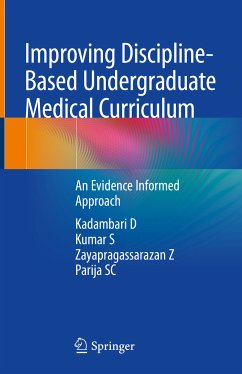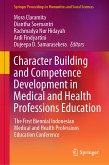The past few decades have seen the increasing use of evidence in all aspects of healthcare. The concept of evidence-informed healthcare began in the 1990s as evidence-informed practice, and has since become widely accepted. It is also accepted that the training of medical graduates must be informed by evidence obtained from educational research. This book utilizes an evidence-informed approach to improve discipline-based undergraduate medical curricula.
Discipline-based undergraduate medical curricula represent a widely adopted choice for undergraduate medical education around the world. However, there have been criticisms leveled against the discipline-based approach. One of the shortcomings cited is that students are insufficiently equipped to meet the challenges of today's healthcare.
As a result, various strategies have been proposed. One option, currently in vogue, is the outcome-based approach, wherein the exit behaviors of medical graduates are explicitly examined and used to guide the educational process. The shortcomings present in discipline-based undergraduate medical curricula can be overcome by the strengths of these strategies. This book recommends improving discipline-based undergraduate medical curricula by combining several strategies, including the adoption of an outcome-based approach and the use of evidence-informed implementable solutions.
The book is relevant for all faculty, administrators and policymakers involved in undergraduate medical education, and can also be used as a resource for faculty development.
Discipline-based undergraduate medical curricula represent a widely adopted choice for undergraduate medical education around the world. However, there have been criticisms leveled against the discipline-based approach. One of the shortcomings cited is that students are insufficiently equipped to meet the challenges of today's healthcare.
As a result, various strategies have been proposed. One option, currently in vogue, is the outcome-based approach, wherein the exit behaviors of medical graduates are explicitly examined and used to guide the educational process. The shortcomings present in discipline-based undergraduate medical curricula can be overcome by the strengths of these strategies. This book recommends improving discipline-based undergraduate medical curricula by combining several strategies, including the adoption of an outcome-based approach and the use of evidence-informed implementable solutions.
The book is relevant for all faculty, administrators and policymakers involved in undergraduate medical education, and can also be used as a resource for faculty development.
Dieser Download kann aus rechtlichen Gründen nur mit Rechnungsadresse in A, B, BG, CY, CZ, D, DK, EW, E, FIN, F, GR, HR, H, IRL, I, LT, L, LR, M, NL, PL, P, R, S, SLO, SK ausgeliefert werden.









